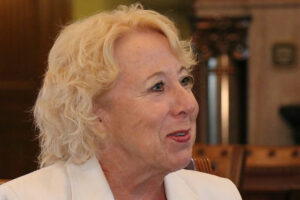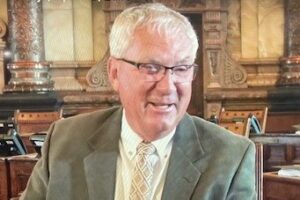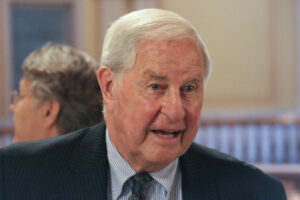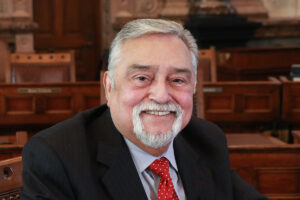Topic: Highway program

Interview of Christine Downey, August 2, 2019
Interviewed by Dale Goter
Former State Senator Christine Downey recalls her three terms in the Kansas Senate (1993-2004) during her 2019 oral history interview. With her background as a teacher, education issues were important to her as the era of school-funding litigation continued. She was involved in water-related policy making, in particular at the nexus of water quality and agricultural practices. She recalls her service in the Senate and on the Kansas Board of Regents first developing the policy and then implementing fundamental changes to the postsecondary education system. Ms. Downey discusses numerous instances of working across the aisle Show Moreto accomplish policy objectives that did not break on strict party lines. Show Less

Interview of Fred Kerr, March 30, 2015
Interviewed by Burdett Loomis
This is the first of two oral history interviews of Fred Kerr in this collection. (Ed Flentje conducted the second interview 2018.) Kerr reflects on his 15 years in the Kansas Senate representing the 33rd Senate district. He recalls Senate leaders and fellow Senators who helped him as a freshman and the influence of those mentors on his career. Fred talks extensively about the process involved in securing a leadership position in the Senate and the dynamics of leadership races. He also reflects on the urban-rural divide in Kansas politics that during the late Show More1970s and early to mid 1980s was often more of a force than the partisan divide. A version of this interview is also posted on KansasMemory.org, the website of the Kansas Historical Society. A more recent oral history interview of Fred Kerr is here. Show Less

Interview of Fred Kerr, April 13, 2018
Interviewed by H. Edward (Ed) Flentje
Fred Kerr reflects on his 15 years in the Kansas Senate representing the 33rd Senate district. He recalls Senate leaders and fellow Senators who helped him as a freshman and whose influence guided him throughout his career. Fred talks about the process involved in securing a leadership position in the Senate and the dynamics of leadership races. He observes how relationships between competitors for leadership offices affected Senators differently and how they worked together in subsequent legislative sessions. He also reflects on how decisions were made regarding tax policy both to fund highways and public schools. Show MoreFred, who ran for Governor in 1994, comments about the increasing influence of money and monied interests in state-wide politics. A previous oral history interview of Fred Kerr is here. Show Less

Interview of Robert (Bob) Miller, November 9, 2017
Interviewed by H. Edward (Ed) Flentje
Former Speaker of the Kansas House of Representatives, Robert (Bob) Miller recalls his many years of service to the State. He describes his involvement with the Young Republicans at K-State, his first campaign to represent his area of Sumner County, and moving up through the ranks in the House despite not having ambition for any other elected position. Miller reflects on his sometimes arms-length relationships with fellow House members and with lobbyists. From his position as chair of the House Federal and State Affairs Committee he oversaw the development of implementing legislation for liquor-by-the-drink, parimutuel wagering, and Show Morethe State Lottery by building subject-matter expertise within the committee. Miller describes instances when legislators' positions on policy issues did not break along purely partisan nor on purely urban-rural lines. He also witnessed the early development of what eventually became the conservative movement in the Legislature.
A version of this interview is also posted on KansasMemory.org, the website of the Kansas Historical Society. Show Less

Interview of Robert (Bob) Storey, February 5, 2015
Interviewed by Burdett Loomis
Bob Storey in his 2015 oral history interview recalls his service in the Kansas Senate from 1969-1976. His recollection is of a senate that was in transition in terms of urban-rural influence on policymaking due to the one-person, one-vote principle enunciated by the U.S. Supreme Court in the mid-1960s. He recalls intricacies of interactions among senate leaders and governors and occasional intrigue in senate leadership elections. He also reflects on improvements in the functioning of state government during the years when reorganization and modernization of many state functions took place.

How Things Got Done in the Kansas Legislature
In this video, compiled from interviews on this site, 12 former Kansas legislators who served from 1960-2010 talk about why they ran for public office, how they developed and executed strategy, and how different leaders perceived their roles and what they accomplished. Among others you will hear Dick Bond describe initiating renovation of the Capitol, Steve Morris recall creating a plan to train more engineers, and Fred Kerr explain the need for reappraisal and classification. You also hear Mike Hayden recount lessons learned from two Speakers with vastly different styles who preceded him – Pete McGill and Wendell Show MoreLady. Show Less

Interview of Paul Feleciano, February 11, 2022
Interviewed by Eric Sexton
Paul Feleciano served from 1972 until 2003 in the Kansas Legislature, primarily in the state Senate. During his 31 year tenure he has served on almost every committee. His interview discusses a wide range of issues including groundwater management, mental health reform, changes in the penal system, but his descriptions of the personalities of Senate leadership make that era come alive. He characterizes the men and women serving in the 1970's and 80's as giants --articulate, caring, compassionate problem solvers who would work "across the aisles" to make things happen. As the legislature moved into Show Morethe 21st Century, Feleciano notes the split in the Republican Party between conservatives and moderates became a real problem because the impact was, "they didn't want to compromise." After leaving the legislature, Feleciano was appointed to the Kansas Parole Board and served there for six years. Show Less

Interview of Mark Parkinson, December 14, 2010
Interviewed by Bob Beatty
The article linked below and downloadable, “ 'You can get a hell of a lot done as a governor': A Conversation with Former Governor Mark Parkinson," edited by Grant Armstrong, Bob Beatty, and Amber Dickinson, is, as noted in the body at footnote 3, excerpted from interviews conducted with Mark Parkinson in 2010 and 2021. The article was published in the Spring 2022 issue of Kansas History: A Journal of the Central Plains. The questions were removed and footnotes added during preparation of the transcripts for publication as a journal article. The Kansas Oral History Project is Show Moregrateful to the Kansas Historical Foundation for allowing us to post this article as part of the collection of interviews of Kansas Governors.
From the Kansas History Kansas History webpage: "The seventh piece in our special series of articles based on interviews with former Kansas governors, this conversation with former lieutenant governor and governor Mark Parkinson explores topics such as the Kansas death penalty law, alternative energy and the proposed Holcomb coal-fired power plants, budget cuts and tax increases to deal with the great recession of 2009, and the possibilities for Democrats and Republicans to work together in Kansas."
Show Less